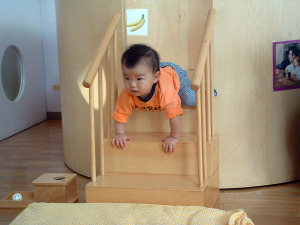
The human being grows based on experiences in his or her environment. Brain development and learning are based on an individual’s interaction with sensory information. Even in utero, our brains react, change and grow according to stimuli.
Human beings are born to connect positively to the people and objects in their immediate surroundings. We naturally connect with our mothers and fathers, the toys in our cribs, the blankets that cover us, the music and sounds that soothe us.
Conversely, newborns are preconditioned to protect themselves from loud noises, changes in temperature, physical harm, as well as a lack of food or attention.
A built in alarm system–baby’s wail and will–is part of the human package.
Depending on events in an infant’s environment, brain development and learning follow paths of positive interaction and seek to create and repeat similar situations; or create routes of avoidance in the case of stimuli that do not lead to positive interaction and growth.
Many opportunities to aid our children’s optimum development are diminished or lost because of parents’ and society’s ignorance of the importance of the first six years of life as the foundational platform on which each child builds an adult.
“The child is the father to the man.”
It is the child’s blood, sweat and tears that build an adult human being.
Movement, language, social relationships, a sense of order and refinement of sensory perception are critical or sensitive periods of development from birth through age six years.
Our being aware of these periods assist in a child’s growth.
Movement and brain development are intricately interrelated in the young child, and movement continues to be important to learning for all of our lives. Opportunities to explore, orient and repeat self-selected activities create optimum conditions for the neural pathways of the young brain to become substantial and diverse.
Language development in the young child is fully formed by the age of 30 months and relies on subtle and almost constant interaction of the child with the people in his or her environment. A place rich in language affords the child a wealth of spoken and receptive language that leads to the acquisition of written language. This period of learning language will never be as effortless as in this first six years of life.
Foundational social skills and personal relationships are established during a child’s first six years. Compared to a ten-year old, it’s relatively easy for a three-year-old to learn how to say “please” and “thank you.” Trust and other foundational skills for human relationships are established during this first six years. Childhood issues of distrust and abandonment leave holes and scars that deeply affect future adult relationship building.
The developing sense of order in the young child creates foundational learning as experiences in the child’s environment define the essential structure–who, what, when where, why and how–of day-to-day living.
What does a home look life? A family? When are dinner, breakfast, lunch and snacks? How do you take a bath, eat, go to school, clean the house and on and on?
The child’s continued interactions with people and objects refine sensory perception. Tastes, sounds, touching, smells and vision become fine-tuned as input is graduated from dichotomies of good/bad, yes/no and like/dislike.
Apple or apricot? Flavors are defined and named. Sounds are distinguished. A bird or a plane? A sense of touch learns to differentiate velvet from burlap. The nose figures out skunk and steak. The eyes recognize thousands of objects and discern subtleties of size and color. Small, bigger, biggest. Magenta, violet, lavender.
Learning success has its roots in these first six years of life.
From birth our children’s minds are absorbing and coordinating foundational information as children experience their immediate world. When a child’s early environment is not rich in experiences with people, objects, concepts and nature, many, if not most, learning difficulties take root in these deficiencies.
Children under the age of six learn very differently than any other time in our lives. The work of the child under the age of six requires adequate societal support and understanding.
When will our children become our #1 priority?
From birth our children must become the focus in our new system of education. Our society and our systems must back the work of our families, for it is our families who nurture the emerging individual and nourish vital foundational learning.
This is a series about creating a fresh approach to education.
Next: Educating The Whole Person


One Response to “Human Potential Begins at Birth”